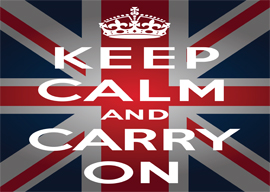
May 30, 2017

Source: Bigstock
Last week’s suicide bombing in Manchester was the first Muslim terrorist attack on the West that didn”t make me angry or sad.
I”m still haunted by and livid about Charlie Hebdo, the Bataclan, and Nice, to name only three. I still have nightmares”impotent dreams of vengeance, really”about September 11. But despite the youth of many Manchester victims, and their membership in my Anglospheric, Commonwealth tribe, I feel nothing”not even numb, because “numb” implies sensation.
My feelings, or lack thereof, I only mention because I”ve heard friends and total strangers say the same thing, too. And this outbreak of outrage fatigue has coincided with”to an even greater degree than usual”a widespread determination to praise or condemn other people’s reactions to the attack, and then the reactions to those reactions, rather than the attack itself (and, it goes without saying”literally”all the Muslims behind it, going back to Muhammad himself).
One reaction in particular: U.K. pundit Katie Hopkins didn”t even use the “I-word” in what I”m amusing myself by calling her “Wannsee Conference” tweet:
22 dead – number rising. Schofield. Don”t you even dare. Do not be a part of the problem. We need a final solution #Machester.” [sic]
There are numberless noble reasons to bravely risk your job. Employing the wholly avoidable phrase “final solution” out of historical context isn”t one of them. That reckless decision cost Hopkins her radio gig, drew attention away from her fine Daily Mail column about the atrocity, and worst of all, gave quislings and squishes the hook they”d been looking for on which to hang their misplaced, wrong-size outrage.
The biggest dick in this most recent Katie Hopkins gang rape was attached to”surprise!”a Guardian writer, one Marina Hyde.
Hyde started out praising one victim’s brother’s fondly affectionate yet dark-humored quips on Twitter, after the poor young man’s name started “trending.” Fine. But then Hyde weirdly counsels the rest of the nation to adopt an identical attitude.
A moment’s reflection might have prompted Hyde to reconsider her brain wave that every Briton should react to other people’s agony by tweeting things like “I was a little dubious about Martyn’s recent bold social media move. But it worked.”
For that’s what she’s counseling, intentionally or not:
Whatever our idealised “British values” are”and codifying them would obviously be appallingly against British values”they feel to me better embodied in the heroically black humour of Dan Hett in the days after his brother’s murder than in anything Katie Hopkins has said or written, ever.
Throughout the column, Hyde makes the case that being ever so archly witty about death and dismemberment (even the slaughter of strangers; even, apparently, children) is more patriotic, more reflective of traditional “British values,” than calling for the cessation of these atrocities, however clumsily and even obtusely.
Leftists enjoy quoting Johnson, that “patriotism is the last refuge of the scoundrel,” especially because the “scoundrel” is so rarely them. But here we have one, and a Guardianista, no less, wrapping herself in the flag, a fashion British leftists last felt socially obligated to adopt during World War II.
Speaking of which, Hyde also bashes those who, in the wake of these attacks, “trade in fake Churchill quotes.” Surely she can”t be referring to this very real one, but in any case, yes, every terrorist attack in England stirs up talk of the Blitz, just as Princess Diana’s funeral, going on twenty years ago, is still contrasted with Churchill’s, to considerable rhetorical, if not practical, effect.
(Admit it, guys: We”ve lost the war on teddy bears and the other dollar-store accoutrements of “makeshift memorials.” All we”ve done is condemn them, in often bracingly beautiful prose, but we”ve never offered the unchurched an attractive alternative, and so a generation later, trash is “tradition.”)
I”ve written about this here before, exactly four years ago, in fact. The prompting circumstance then was the uninterrupted slaughter of a British soldier, on a busy street, in broad daylight, by yet another Muslim savage”the anniversary of which, a few dared to notice, fell on the date of Ariana Grande’s Manchester gig.
And back then, I expressed this bitchy blasphemy:
Londoners” highly touted “courage” during the Blitz always struck me as mostly an extreme expression of the average Briton’s temperamental tilt toward weary resignation and inertia.
Since writing that, I learned something that seems awfully apposite just now:
We”ve all seen (and seen and seen) those “Keep Calm and Carry On” posters and related gift-store goodies. These nostalgic relics, we”re told, perfectly embody the English home-front spirit throughout WWII.
Except it turns out they sort of don”t.
The Ministry of Information printed these posters by the millions, but they were never plastered up. Rather, one copy was discovered in 2000 in a used bookstore, framed, and put on display behind the cash register, and the rest is pop culture history.
Adopted after 9/11 and, in particular, 7/7 as a whimsically defiant meme, “Keep Calm and Carry On” was, amusingly, judged an unsuitable morale-booster in its day.